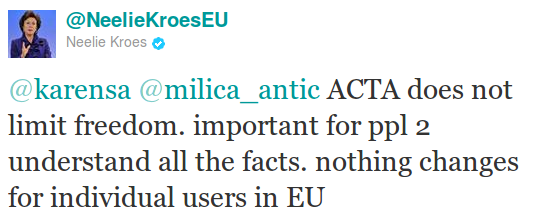Paris, February 6th, 2012 – The EU Commission is relentlessly defending ACTA, the Anti-Counterfeiting Trade Agreement, which faces widespread opposition in Europe and beyond. Falsely portraying ACTA as an acceptable agreement, the Commission is paving the way for its ultra-repressive copyright enforcement agenda, as revealed in documents just released. Citizens and their elected representatives across Europe must denounce this dangerous drift of the policy-making process, which is bound to undermine freedoms online and the very architecture of the Internet, and instead require a thorough reform of copyright.
Last week, Neelie Kroes (EU Commissioner for the Digital Agenda) and Viviane Reding (EU Commissioner for Justice, Citizenship and Fundamental Rights) have both expressed their support for ACTA, assisting Karel De Gucht, Commissioner for International Trade, in selling this infamous agreement to the EU Parliament. Commissioner De Gucht has been spending a lot of time last week lobbying in the EU Parliament, meeting with various political groups to convince them that the opposition to ACTA is based on misinformation and that Members of the EU Parliament (MEPs) should accept it.
Seeing both Neelie Kroes and Viviane Reding so oblivious to the many criticisms against ACTA is extremely worrying. As La Quadrature points out in a participative document1https://www.laquadrature.net/wiki/Counter-Arguments_Against_ACTA, the arguments put forward by EU Commissioners in favour of ACTA don’t resist scrutiny.
More disturbingly, without even waiting for the European Parliament’s decision to accept or reject ACTA, Commissioner Michel Barnier, in charge of the Internal Market, is already pushing for new repressive copyright enforcement measures similar to those of the SOPA/PIPA bills in the US. A recently published roadmap document on the revision of the “Intellectual Property Rights Enforcement Directive” (IPRED2See our webdossier on IPRED: http://www.laquadrature.net/en/anti-sharing-directive-ipred) confirms that the Commission specifically wants to tackle online infringements, using ACTA to implement private censorship mechanisms in European law3According to this document, “the relative anonymity of the internet, its cross-border nature and its consumer- and user-friendly services accessible from all around the globe have created an online environment where the infringers cannot be easily identified, digital evidence is hard to preserve, damages from internet sales are difficult to quantify and, after having been discovered, infringers quickly “re-appear” under a different name“. See: http://ec.europa.eu/governance/impact/planned_ia/docs/2011_markt_006_review_enforcement_directive_ipr_en.pdf.
The document suggests that expeditious, extra-judicial take-down of online content, financial lock-down of allegedly infringing websites and even filtering measures of Internet traffic could be considered4Like ACTA’s article 27, IPRED already provides measures to “deter further infringement”. It seems that the Commission wants to impose ad hoc measures to prevent infringements.
During a EU Parliament hearing on trademarks in mid-January, Jean Bergevin, head of unit for IPR enforcement at the EU Commission, pointed out that DNS blocking was being considered as a last resort measure when civil enforcement fails to stop the infringement. under the guise of cooperation between Internet actors and the copyright industries5Cooperation is a make-up word for extra-judicial measures. ACTA encourages such cooperation to tackle allegedly infringing content online (article 27.4). The roadmap document reads:
“Complementary measures in soft-law instruments designed at disrupting the business/value chain of counterfeiters and at increasing the cooperation between intellectual property rights holders and intermediaries (e.g. internet service providers, shippers and couriers, payment-service providers etc) could not be excluded”.
This clearly echoes the provision of SOPA and PIPA. Upon notification by the entertainment industries, search engines as well as payment providers and advertisers would have been prevented from providing services or contracting with targeted websites, without any judicial decision. For a detailed analysis of these provisions, see: http://benkler.org/WikiLeaks_PROTECT-IP_Benkler.pdf
See how “cooperation” has become a buzzword in copyright enforcement policies: http://www.laquadrature.net/wiki/Cooperation. Furthermore, there is a clear will to extend the scope of sanctions through a definition of “commercial scale” that would include any activity which can be said to result in losses of revenues for film and music majors6See counter-arguments to the EU Commission’s claim that ACTA is only about large-scale counterfeiting: https://www.laquadrature.net/wiki/Arguments_Against_ACTA#.22ACTA_does_not_even_change_EU_law.22_and_.22provides_adequate_protections_for_fundamental_rights.22.
“The European Commission is trying to bypass democracy to impose repressive measures that will be made inevitable by ACTA. While Michel Barnier is already working on implementing ACTA’s repressive measures in EU law in the IPRED revision, commissioners De Gucht, Kroes and Reding are asking the Parliament to accept ACTA as if it were a harmless trade agreement. The truth is that the Commission is trying to impose the industry’s agenda to enforce outdated copyright, patent and trademark policies through tough criminal sanctions and extra-judicial measures.” said Jérémie Zimmermann, spokesperson for the citizen advocacy group La Quadrature du Net.
“What is needed is not tougher enforcement, but an open-ended debate to positively reform a copyright regime that is increasingly running counter to fundamental rights and innovation. If ratified, ACTA would create new and significant obstacles to reform. EU citizens must continue to urge their elected representatives to reject ACTA. It is the only way to block this repressive arms race and develop a positive framework for creative activity in the digital environment and new cultural practices.” declares Philippe Aigrain, co-founder of La Quadrature du Net
References


